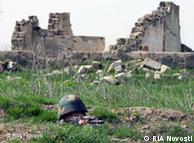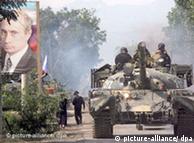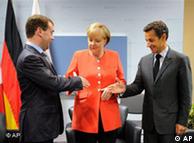SECURITY | 15.10.2010
Think tank report urges EU to reconsider chosen security strategies
German Chancellor Angela Merkel will attend the annual Deauville Summit on Monday to hold talks with French President Nicolas Sarkozy and Russian President Dmitry Medvedev on how security cooperation between the three nations can be improved.
The three leaders will also discuss their joint positions ahead of the Group of 20 (G20) summit in South Korea on November 11-12 and France's objectives for when it assumes the leadership of the G20 in November and the Group of Eight (G8) in January.
The meeting in the French town comes at a time when relations between Russia and the EU seem to be improving with Moscow showing signs that closer ties with the EU, especially with those former Soviet states which are now members of the European bloc, have become a priority.
Among the security issues up for discussion on the Deauville agenda will be the stability of restive regions on Europe's eastern flank and potential flashpoints such as the breakaway Moldovan region of Transdniestria, and the stand-off between Armenia and Azerbaijan over Nagorno-Karabakh.
While these and other issues between the nations which make up Russia and the EU's collective neighborhood all have strategic and security concerns for those in attendance, a report released Friday by the European Council on Foreign Relations (ECFR) think tank claims that "the Merkel-Medvedev-Sarkozy summit has the right agenda but the wrong participants."
Report suggests EU needs to look to Russia, Turkey
 Tensions are still high in the region of Nagorno-Karabakh
Tensions are still high in the region of Nagorno-Karabakh
In the report entitled "The illusion of order and the specter of a multipolar Europe," authors Mark Leonard, the ECFR's director, and Ivan Krastev claim that a European security trialogue between the EU, Russia and Turkey would be more effective in tackling conflicts and promoting stability in the problem regions of Eastern Europe and Central Asia.
"The idea is that an informal forum with the key players could breathe life back into the formal European security institutions," Mark Leonard told Deutsche Welle. "One of the reasons that the current institutions are dead-locked is the fact that Russia is questioning their legitimacy."
"Meanwhile Turkey is frustrated at the short-sighted way that some EU member states are holding up the accession process. It is so difficult to get things done through the formal institutions that Europe's powers are often acting outside them. This is not good for the EU as we want a continent run through multilateral institutions rather than spheres of influence or the balance of power. The report argues that we should therefore engage with the other players to revitalise these institutions."
"The EU is missing an opportunity to think creatively about a new security architecture and come up with its own initiative on the future of the European order," Leonard added.
Europe urged to take responsibility
 The Georgia War highlighted Europe's weaknesses
The Georgia War highlighted Europe's weaknesses
With the United States, Europe's erstwhile protector, shifting its focus to its own concerns in Afghanistan, Iran and China, the ECFR report calls on the EU to take more responsibility for security in its own neighborhood. It states that the current security system has failed to prevent wars in Kosovo and Georgia, gas and oil disputes between Russia and Ukraine and defuse tensions between Moscow and former Soviet states and must adapt to a new reality.
"All three players are very much affected by the states on the EU's eastern flank and have developed complex 'neighborhood policies' to manage relations with the western Balkans, Eastern Europe and Central Asia," said Mark Leonard. "This grey zone of instability is threatened with ethnic tensions, weak states and energy issues."
The report suggests that a three-way dialogue leading to a potential security action plan with Russia and Turkey would provide the EU with a new structure in which it could participate in reducing tensions on its borders by demilitarising the continent's most volatile regions and solving frozen conflicts.
It also claims that if the initial results were satisfactory, EU nations could then be more receptive to Russian President Medvedev's proposal for a European security treaty, a plan which has been met with suspicion and skepticism by a number of member states, as well as the US, which believe any such treaty could undermine NATO and provide Russia with a veto of the alliance's activities.
The ECFR has rejected the claim that such a security apparatus involving Russia would threaten the NATO-Russia Council or other existing structures such as the Organisation for Security and Cooperation in Europe (OSCE), saying that any new forum would work alongside existing structures.
Continue reading for more on a pan-European security concept

Comments